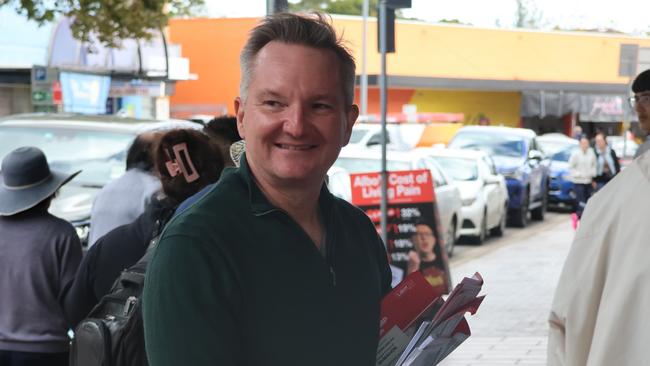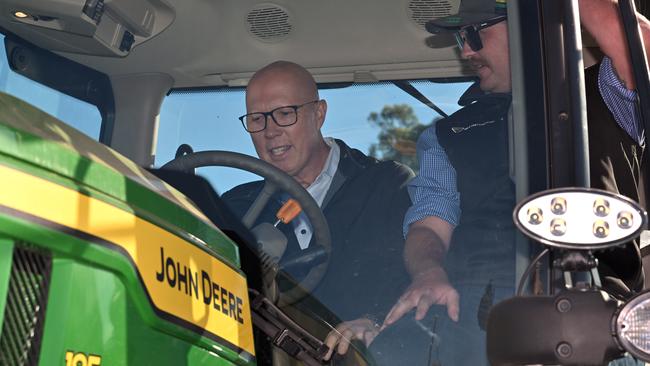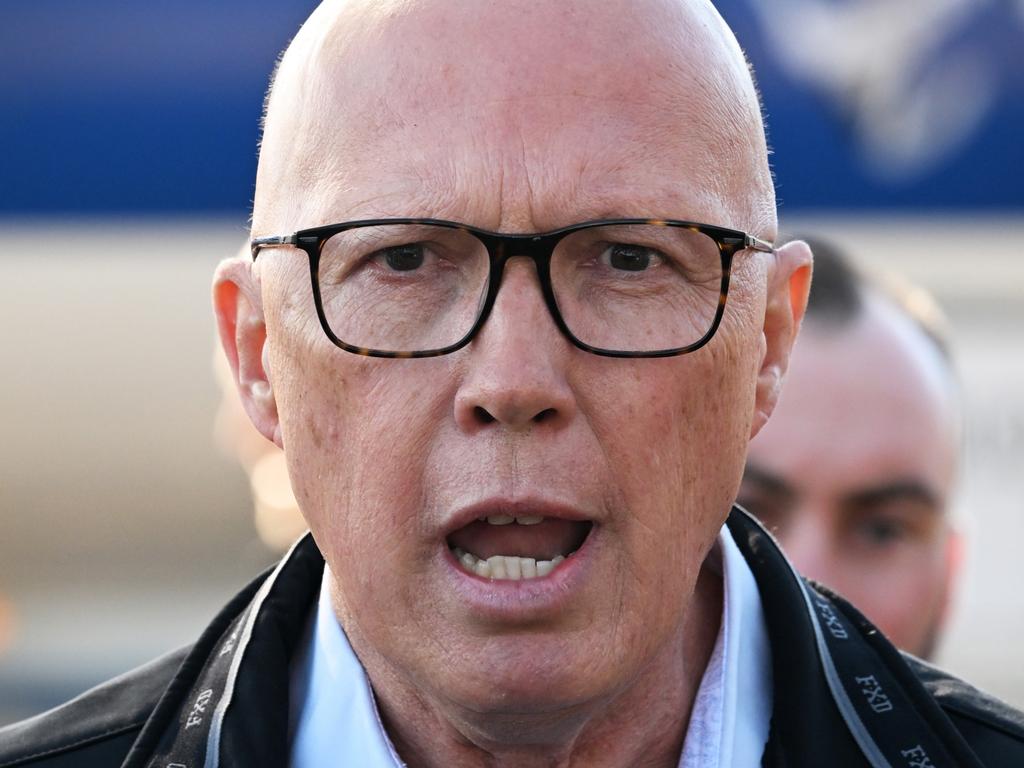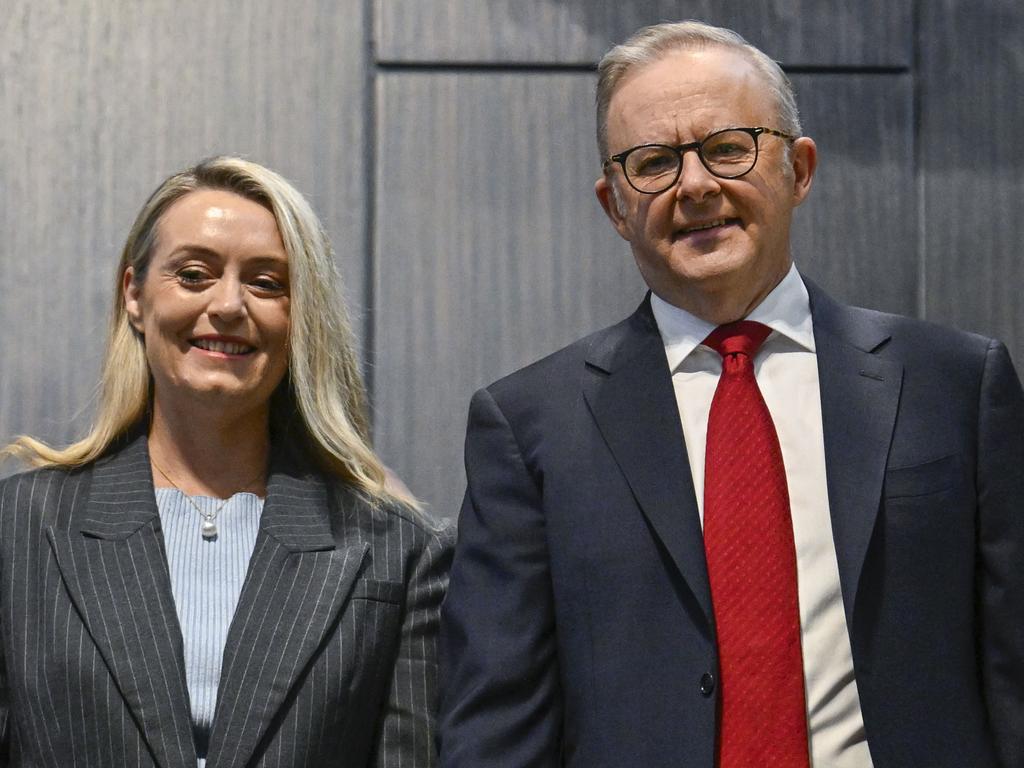Election 2025: Coalition’s $30bn change of climate for energy market
Peter Dutton’s reshaping of the energy market would gut more than $10bn out of Anthony Albanese’s climate change, renewables and environment programs as part of savings to deliver $13.9bn in lower deficits than Labor.

Peter Dutton’s reshaping of the energy market would gut more than $10bn out of Anthony Albanese’s climate change, renewables and environment programs – in addition to dumping the $20bn Rewiring the Nation fund – as part of savings to deliver $13.9bn in lower deficits than Labor.
Coalition costings released ahead of Saturday’s election revealed opposition Treasury spokesman Angus Taylor had swung the axe across the Prime Minister’s marquee net-zero, electric-vehicle and green-hydrogen funding programs.
The Opposition Leader’s economic and fiscal strategy unveiled on Thursday baked in almost $17.3bn in cuts to the public service, $814m in reduced foreign aid spending excluding the Pacific and Indonesia, and $3.6bn in new revenue raised from regulating vaping. A Dutton government would slash at least $10.1bn from Mr Albanese’s climate change, environmental and renewables programs including Labor’s $3.2bn tax breaks for electric vehicles, $2.3bn for home batteries and $1.5bn for hydrogen production tax incentives.
The Coalition, which is desperate to win back inner-city seats from Climate 200-backed teal independents, would axe the “family car and ute tax” at a cost of $590m and save $1.7bn through cuts to the Australian Renewable Energy Agency.
Mr Dutton’s commitment to tear down Labor’s climate change agenda came as Spain and Portugal – which rely heavily on solar power – were this week hit with massive blackouts and former British prime minister Tony Blair warned net-zero policies that phased out coal and gas in the short term were “doomed to fail”.
Mr Albanese and Energy Minister Chris Bowen this week defended their green-energy policies, declaring they were balanced and “in our economic interest”.
“I reject that categorisation (of having a renewable-focused policy); that’s the Liberal Party’s characterisation,” Mr Albanese said. “Our plan is for renewables, backed by gas, backed by batteries and backed by hydro firming capacity.”
Mr Dutton is promising to deliver zero-emissions nuclear energy combined with gas, coal and renewables to lower power prices in contrast with Labor’s renewables approach, which failed to deliver on Mr Albanese’s 2022 pledge that power bills would be $275 lower from this year.
After releasing the costings, Mr Taylor declared the Coalition’s economic plan would “fix energy markets” and attacked Labor for “completely failing” on the supply side of the energy sector.
Dr Chalmers accused Mr Taylor of planning “savage cuts to energy”.
Despite the Coalition attacking Labor’s off-budget spending, Mr Dutton’s $120bn plan to build up to seven nuclear reactors across the country would be funded via an off-budget vehicle. The Coalition, which pledged $246.4m in on-budget funding for nuclear energy community consultation and safety-related programs, will underpin its nuclear plan with $36.4bn in equity investments through to 2035, which will rise to $118.2bn by 2050. Mr Taylor and _finance spokeswoman Jane Hume said their budget plan would deliver $13.9bn in lower deficits and reduce gross debt by $40.8bn over four years. The Coalition would deliver higher deficits than Labor in 2025-26 and 2026-27. In a move that helps strengthen the books over the forward estimates, the Coalition has pushed out $8.3bn of its promised $21bn in additional defence spending to a fifth year.
The Coalition will forego $5.49bn in revenue by ditching Jim Chalmers’ tax on unrealised capital gains and cop a $4.21bn budget hit from reducing permanent migration.
Mr Taylor linked the Coalition’s higher deficits in the first two years to Mr Dutton’s $16bn cost-of-living announcements headlined by a temporary tax offset for low-to-middle income earners and halving fuel excise for 12 months.
“Since the last election, Labor has added $425bn in spending and thrown away almost $400bn in extra revenue instead of rebuilding fiscal buffers and paying down debt,” Mr Taylor said.
“Labor spent the boom, wasted the windfall, and left families worse off – we’ll clean up the mess and rebuild Australia’s future.”
The Coalition’s underlying budget position is worse in the first two years by $7.9bn compared with Labor’s, but then improves by $21.7bn in the third and fourth years combined.
Economist Chris Richardson said the Coalition strategy was all about timing, with more election-driven promises hitting the underlying balance in the short-term. “The Coalition is providing bigger bribes upfront in the beginning and smaller more temporary bribes later on,” he said.

“When it comes to off-balance-sheet strategy, it’s the opposite – they are making bigger savings early through getting rid of renewables and then making little ones later as they invest in nuclear energy.”
Mr Taylor said the Coalition’s costings promised the “biggest improvement in the budget position” in almost 15 years outside Bill Shorten’s big-taxing 2019 election manifesto.
The Albanese government is forecasting deficits over the next four years totalling more than $150bn and off-budget spending to hit $103.9bn by 2029-30.
The Coalition economic plan commits to abolishing Mr Albanese’s $15bn National Reconstruction Fund, $10bn Housing Australia Future Fund and $19.5bn Rewiring the Nation fund. Scrapping the NRF would deliver a hit to the underlying budget of more than $500m but that is due to not realising the returns forecast from that fund.
Global credit ratings agency S&P on Monday warned that Australia’s AAA credit rating was at risk due to the election spendathon and massive growth of off-budget funds. The warning, dismissed by Mr Albanese, came as Dr Chalmers outlined a $1bn improvement in the budget bottom line based on a second-term Labor government slashing consultants and increasing international student visa fees.
The Treasurer said on Thursday the Coalition costings were a “con job” and attacked Mr Taylor for taxing “kids on vapes” rather than getting them off vaping products. “It’s hard to imagine Angus Taylor has had three years to come up with this. These costings released this afternoon by the Coalition are a joke, they are a sham, they are a costings con-job,” Dr Chalmers said.
In his first major criticism of the opposition, Judobank chief economic adviser Warren Hogan condemned the Coalition’s election policy offering and accused the Liberals and Nationals of letting down “the principles of what they stand for”.
“The way they have ‘MeToo-ed’ everything through the election campaign has undermined their credibility. That is disappointing because it does hurt their credibility. You have got to stick to your guns … you have got to have the courage to say what you believe in, take the heat and let the people decide,” Mr Hogan said.





To join the conversation, please log in. Don't have an account? Register
Join the conversation, you are commenting as Logout